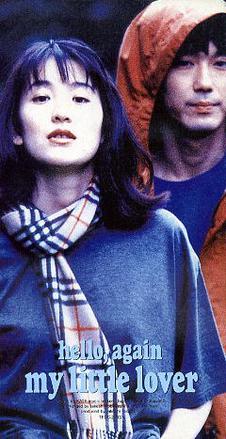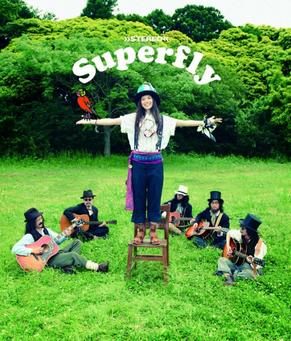"This Is Love" is Hikaru Utada's first Japanese digital single. It was released on May 31, 2006 as a promotional single for her fourth Japanese studio album. "This Is Love" was tied-in as the CM song for a Nissin cup noodle campaign and the opening theme for an anime "Freedom," which was also tied into the Nippon campaign. The digital single reached number one in virtually every online music store in Japan prior to the ULTRA BLUE album's release, including the most used store in Japan, iTunes Japan, as well as OnGen, among others. Utada herself is quoted to have said that this song is about expressing that "Love is like a mix of extremes: anxiety and peace."
"Eternally" is a song by Japanese musician Hikaru Utada, from their 2001 album Distance. It was re-arranged in 2008 as "Eternally (Drama Mix)" for use in the Maki Horikita starring Fuji TV drama Innocent Love. It was released as a digital single on October 31, 2008, and eventually released onto CD in March 2009, on an EMI compilation album I: Zutto, Zutto, Aishiteru (i(アイ)~ずっと、ずっと、愛してる~).
The discography of Japanese contemporary R&B singer and Thelma Aoyama consists of seven studio albums, six compilation albums, one extended play, one remix album, one cover album, two video albums and numerous solo and collaboration singles. Aoyama debuted as a musician in 2007 under Universal Music Japan, and became famous through her collaboration song with rapper SoulJa, "Koko ni Iru yo". Aoyama's version "Soba ni Iru ne" became one of the most successful songs of all time in Japan, certified for three million ringtone downloads and three million downloads by the RIAJ.
Hilcrhyme is a Japanese two member hip-hop group. The band's name is a pun on the Japanese pronunciation of hillclimb and the word rhyme. They are best known for their 2009 hit song "Shunkashūtō", which has been certified for 1,000,000 cellphone digital downloads and 1,000,000 ringtone downloads separately. The group was named the New Artist of the Year at the 24th Japan Gold Disc Awards.
SoulJa is a Japanese hip-hop musician and songwriter best known for his collaborations with singer Thelma Aoyama, "Koko ni Iru yo" and "Soba ni Iru ne" – the latter of which was the former Guinness World Records holder for the best selling digital single of all-time in Japan.
Lil'B is a Japanese female pop duo, consisting of singer Mie and rapper Aila. They debuted in 2008 with "Orange," the 15th ending theme song for the anime Bleach. They are best known for their song "Kimi ni Utatta Love Song," which topped the RIAJ's monthly ringtone chart in 2008. They are also well known for their single "Tsunaida Te", which was the 3rd ending theme song for the anime Fullmetal Alchemist: Brotherhood.

"Hello, Again " is a song by Japanese band My Little Lover. It was released as a single on August 21, 1995, and is currently the band's biggest hit single.

"Hotaru/Shōnen" is the twenty-sixth single by Japanese artist Masaharu Fukuyama. It was released on 11 August 2010.

"Kimi tte" is a song by Japanese pop singer Kana Nishino. It was released as her 12th single on November 3, 2010. The song was marketed as a "heart-warming tender" mid-tempo ballad in the initial press release, also describing the lyrics, as being about "scaling up passion to love."

"Koisuru Hitomi wa Utsukushii" is a song by Japanese musical act Superfly. It was released as a double A-side single along with "Yasashii Kimochi de" in 2009, a month before Superfly's second studio album Box Emotions. An upbeat disco-inspired song that was a change in style from her previous sound, the song was used in commercials for Canon's Digital IXUS cameras in Japan.
The discography of Japanese musical act Superfly consists of seven studio albums, four compilation albums, three extended plays, five video albums and thirty-four singles. Superfly began as a duo in 2003 by vocalist Shiho Ochi and guitarist Koichi Tabo; signing with Warner Music Japan in 2007. Tabo left the band in 2007 just before the release of their single "I Spy I Spy", finding it difficult to work as both the act's songwriter and guitarist. However, Tabo remained attached to Superfly, composing and producing songs for the unit until Superfly's single "Ai o Karada ni Fukikonde" (2014) and Superfly's fifth studio album White (2015), where Ochi collaborated with a range of songwriters instead.

"Ai o Komete Hanataba o" is a song by Japanese pop-rock act Superfly. Used as Edison no Haha's theme song, "Ai o Komete Hanataba o" was released as the band's fourth single on February 27, 2008. The song was Superfly's break-through single, breaking into the Oricon physical singles chart's top 20. As of 2011, it is Superfly's most successful single, being certified as a million ringtone download, triple platinum as a cellphone download, and single platinum for digital sales.
The discography of Monkey Majik consists of thirteen studio albums, five compilation albums and numerous singles and digital downloads. The band's releases were originally self-released in Sendai, after which they were signed to independent label and management Under Horse Records, and released material through there between 2004 and 2005. In 2005, Monkey Majik were signed to major label Avex Entertainment, and continue to release under the Binyl Records sub-label.
The discography of Japanese musical act Rip Slyme consists of ten studio albums, four compilation albums, two extended plays, one live album, eight video albums and thirty-three singles. Rip Slyme debuted as an independent act on File Records in 1995, releasing material with them until their major label debut under Warner Music Japan in 2000. The band's second album under Warner, Tokyo Classic (2002) was a commercial success, selling over 1,000,000 copies.
The discography of Japanese pop singer Kana Nishino consists of seven studio albums, six compilation albums, thirty-four singles and ten video albums. Nishino debuted in 2008 under Sony Music Japan, and gained national recognition with the singles "Tōkutemo" and "Kimi ni Aitaku Naru Kara" (2009). Nishino has released some of the most digitally successful songs in Japan: "Motto..." (2009), "Dear..." (2009), "Best Friend" (2010), "Aitakute Aitakute" (2010), "If" (2010) and "Kimi tte" (2010), all of which were certified million by the RIAJ.

"Yasashii Kimochi de" is a song by Japanese musical act Superfly. It was released as a double A-side single along with "Koisuru Hitomi wa Utsukushii" in 2009, a month before Superfly's second studio album Box Emotions.

"Roll Over the Rainbow" is a song by Japanese musical act Superfly. Released as one of the songs on "Wildflower" & Cover Songs: Complete Best 'Track 3', a four-song extended play featuring a cover album as a bonus disc in September 2010, it was used to promote the 2010 United States of Odaiba summer event, organised by Fuji Television.
The discography of Japanese pop group AAA includes eleven studio albums, six extended plays, seven compilation albums, eight live albums, one cover album, three remix albums, and 52 singles. All of the group's releases have been with Avex Trax, a subsidiary of Avex Group.

Thank You, Love is the third studio album by Japanese singer and songwriter Kana Nishino. It was released on June 22, 2011. Nishino acted as the album's primary lyricist, as she had on all of her preceding albums. Thank you, Love was created with the concept of a "warm album" and reflects Nishino's desire to create a work that includes positive elements. Thank you, Love marked new lyrical directions for Nishino: while LOVE one. and to LOVE were solely centered on songs about romance, this work is unique in that it expresses things other than that.








